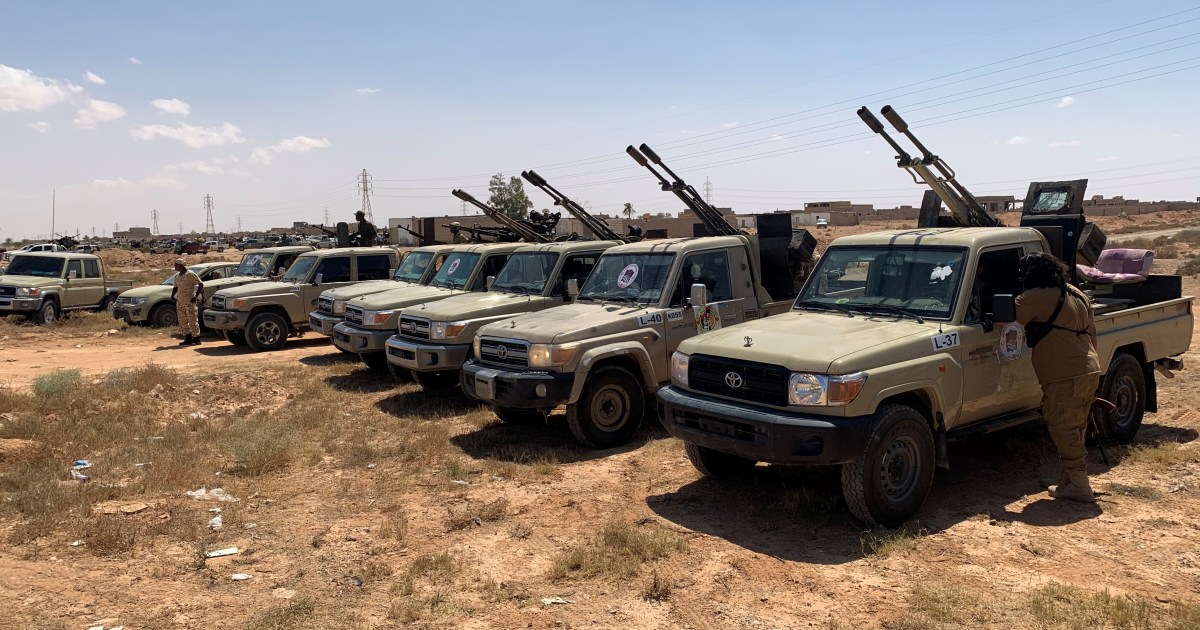The Libyan Government of National Accord officially informed the UN Security Council of the breach by Haftar's forces of the ceasefire after spotting military masses heading to western Sirte.
The Government of National Accord called on the UN Security Council to carry out its duties and take decisive measures against what it described as the irresponsible actions carried out by those it called the aggressors, in reference to the forces of retired Major General Khalifa Haftar.
According to an official government statement sent by the Libyan representative to the United Nations, Taher al-Sunni, to the President of the Security Council, in which he said that "Haftar's militias and foreign mercenaries stationed in the west of the city of Sirte targeted locations of the Libyan army forces of the Government of National Accord, which contradicts the declared ceasefire."
Al-Sunni declared that his country's government warns of the consequences of these violations, which he said reflect the premeditated intention of Haftar's forces leaders to reject a ceasefire to prevent Libya from reaching safety and stability.
Mr. Taher Al-Sunni @TaherSonni, head of the Libyan mission in New York, informed the Security Council about three violations of Haftar's militia and his mercenaries west of Sirte ... to assure the world who seeks peace and is victorious in it and who seeks war and is fleeing from it pic.twitter.com/63w1qS3RML
- Colonel Pilot Muhammad Qununu - Libyan army spokesman (@LyArmySpox) September 9, 2020
On the other hand, the Sirte and Jufrah Operations Room declared a state of emergency in the fighting axes west of Sirte.
The Government of National Accord forces said that they had spotted an armed convoy of Haftar's forces from 80 military vehicles, moving from the Al-Jafra area to the Wadi al-Lud area, southeast of the city of Misurata.
She added that these moves came in conjunction with 5 violations of the ceasefire declaration.
This came a day after the National Accord Forces announced a general mobilization in the areas west of Sirte.
In a related context, the US National Security Council stated, in a tweet on Twitter, that the President of the Presidency Council of the Government of National Accord, Fayez al-Sarraj, pledged during a call with the Council to cease fire and reach a political solution that preserves Libyan sovereignty.
The National Security Council expressed its hope that all Libyan leaders would join Sarraj.
The US is encouraged by UN-facilitated & Libyan-led efforts to resolve the conflict in #Libya.
In a recent call with the NSC, PM al-Sarraj made clear his commitment to a ceasefire & a political solution that preserves Libyan sovereignty.
We hope all Libyan leaders join him.
- NSC (@WHNSC) September 9, 2020
In turn, Mikhail Bogdanov, Deputy Russian Foreign Minister and the Kremlin's envoy to the Middle East and North Africa, announced the Russian-French consultations on Libya, to be held in Moscow on the 11th of this month.
Bogdanov confirmed that the issue of establishing a demilitarized zone in Sirte and Al-Jufrah is under discussion, explaining that a decision in this regard must be made by the concerned Libyan parties.
Diplomatic moves are escalating to find a political solution to end the Libyan conflict, following the Al-Wefaq government forces achieving a series of victories that enabled them to expel the forces of retired Major General Khalifa Haftar from the capital, Tripoli (west) and other cities.
At the end of last July, the head of the Supreme Council of State in Libya Khaled al-Mishri and the Speaker of the Tobruk Parliament, Aqila Saleh, the Moroccan capital, Rabat, visited simultaneously, but they did not hold a meeting together, and the matter was limited to separate meetings with Moroccan officials.
The two parties to the Libyan conflict signed a political agreement on December 17, 2015 in the Moroccan city of Skhirat, which resulted in the formation of a presidential council leading the reconciliation government, in addition to the extension of the parliament and the creation of a higher state council.

